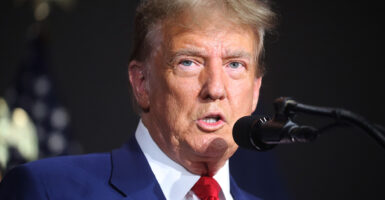The judge overseeing former President Donald Trump’s racketeering case in Georgia declined Thursday to dismiss the charges based on the First Amendment.
Trump’s attorneys argued in a December motion that the indictment “directly targets core protected political speech and activity,” urging Superior Court Judge Scott McAfee to dismiss the charges as violations of the First Amendment. But McAfee found that the state “alleged more than mere expressions of a political nature,” writing that the defendants did not find “any authority that the speech and conduct alleged is protected political speech.”

“Although the defendants characterize the relevant speech or actions as petitions to Congress regarding the validity of electors which must be afforded constitutional protection, at this stage the court must consider the method and manner of the criminal enterprise as alleged in the indictment,” the judge wrote of Trump and 14 co-defendants indicted in connection with trying to overturn the 2020 presidential election results in Georgia.
During a hearing on pretrial motions last week, Trump’s attorney told McAfee there was no “underlying basis” for the case other than protected speech. He said that even false statements are protected, pointing to a 2012 Supreme Court ruling in United States v. Alvarez.
McAfee wrote in his ruling that the allegations contained in the indictment “do not suggest that this prosecution comes solely because it believes the speech was inaccurate.”
“Instead, the indictment avers throughout that the defendants acted ‘willfully’ and ‘knowingly,’ and that they impacted matters of governmental concern,” the judge wrote. “These are not legal conclusions, but issues of fact.”
McAfee left open the possibility that Trump and the other 14 defendants would raise “similar as-applied challenges at the appropriate time after the establishment of a factual record.”
“President Trump and other defendants respectfully disagree with Judge McAfee’s order and will continue to evaluate their options regarding the First Amendment challenges,” Steve Sadow, Trump’s lead defense counsel, said in a written statement.
“It is significant that the court’s ruling made clear that defendants were not foreclosed from again raising their ‘as-applied challenges at the appropriate time after the establishment of a factual record,’” Sadow said.
Originally published by the Daily Caller News Foundation

























